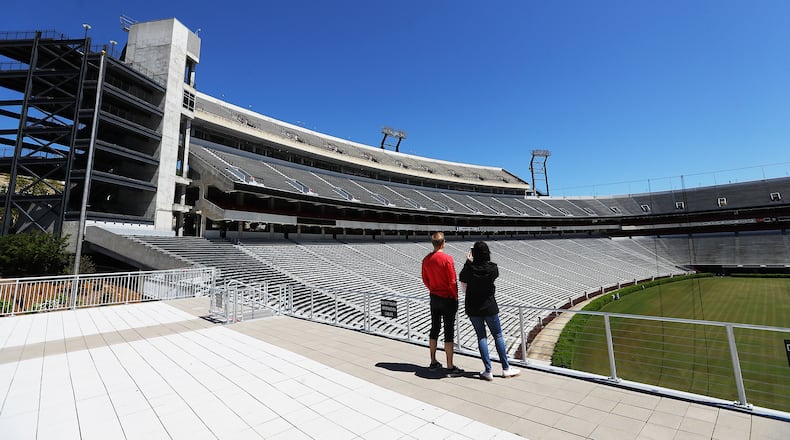I was touched by the video of hospital personnel cheering for Georgia football staffer Jeremy Klawsky as he left Athens Regional Hospital. Klawsky, the team's video coordinator, was released on Thursday after six weeks recovering from COVID-19. Seeing Klawsky wave at supporters before getting into a vehicle gave me a much-needed jolt of hope during our trying times.
Honestly, that video also made me a little scared. I don’t want people who work for Georgia football, or any other program, to get sick from the coronavirus or unwittingly spread the disease in their communities. That includes the players, who have no independent authority with power looking out for their interests.
(I don’t want anyone at all to get sick, of course, but sports is the focus here.)
College sports are shut down now because of COVID-19. Infectious disease experts say there's a good chance of another wave of outbreaks in the fall. College athletics programs are fretting over the possibility of lost football revenue. Will schools send their athletes out to practice and play before it's safe for them and public health?
Developments in the last week make me more hopeful that they won’t do it, even if there are no spectators in stadiums. That’s not because leaders are concerned with player health. I’m sure some of them care about that, but the enterprise of college sports has a long history of prioritizing revenue over player welfare.
I’m more optimistic now because of developments in the last week. Most Americans are against rushing to lift social distancing restrictions. Also, this is a case in which the NCAA’s zealous defense of its “amateur” model might actually work in favor of its unpaid football players.
No one likes the disruptions caused by COVID-19 but most people aren't in a hurry to get back to normal if it means compromising public health. According to a Pew Research poll released on Thursday, 66% of Americans said they are concerned that state governments will act "too quickly" to lift restrictions on public activity. The poll also found that 73% of citizens say they believe the "worst is still to come" with COVID-19.
It’s a relief to see public opinion in favor of a cautious approach. Some irresponsible leaders in government and business are agitating for quickly lifting restrictions without widespread testing, which experts say is key to controlling the pandemic. But most people aren’t as insulated from the consequences of COVID-19 as those leaders.
There is a way for sports to safely return during the pandemic. Dr. Anthony Fauci, the country’s leading infectious disease expert, laid out some guidelines in an interview posted to YouTube. Fauci said games could be played in stadiums without spectators so long as players are strictly quarantined, surveilled and tested every week.
I think that arrangement would be a hard sell for professional athletes. They have the power to negotiate their terms because they have a labor agreement with team owners and union representation. College athletes don’t have the same rights, but football players may not be rushed back to the field under the circumstances.
The NCAA’s “amateur” model relies on the idea that its profit-generating athletes are students, not workers. It would be harder for schools to maintain that artifice if football is being played to make money while campuses are closed. Even if campuses re-open in time, playing games in empty stadiums would contradict the NCAA’s claim that its athletes are integrated with the student body.
NCAA schools can’t risk being so obvious about the fact that their football players are workers. They can’t sever the “student-athlete” construct the NCAA created to shield member schools from worker’s compensation claims. It’s better for schools to forfeit a season of football revenue rather than possibly draw attention from politicians who might question why athletes aren’t considered workers.
That dynamic helps to explain why members of the College Football Playoff management committee told Vice President Mike Pence that games won't be played until all students return to campus. It appears that college football players will get the same protection from COVID-19 as other students, which is a good thing even if it happens for the wrong reasons.
I believe there are college sports officials who genuinely want to do what's best for athletes. Not all of them are as callous as Oklahoma State's Mike Gundy. The coach with the $5 million salary said his unpaid players should return to campus soon because they can fight off COVID-19 if they contract it, and the state needs the money they generate.
Gundy is a selfish clown, but even well-meaning people can get swallowed up by institutions that place money ahead of doing the right thing. That describes college sports. Consider the NCAA’s response to a wrongful death lawsuit filed by the family of a football player who died in 2011 after suffering a brain injury during practice:
“The NCAA denies that it has a legal duty to protect student-athletes, but admits that it was ‘founded to protect young people from the dangerous and exploitative athletic practices of the time.’ ”
That’s typical of the NCAA’s double-talk. Its PR says its mission is protecting athletes. In practice, NCAA schools are more interested in denying responsibility for athletes’ welfare and protecting a system in which the vast majority of money generated by football and basketball players flows to coaches and administrators.
I'm sure there are people so eager to see college football in the fall that they are OK with players risking their health. I'd ask those people to watch the video of Klawsky leaving the hospital and connect with humanity. It would be disappointing if COVID-19 means there's no college football in the fall, but we all can find sources of entertainment that don't put people at risk.
About the Author
The Latest
Featured


